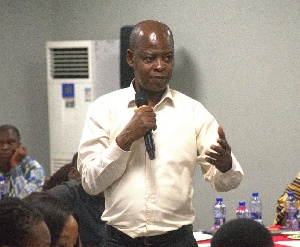Business News of Tuesday, 27 May 2025
Source: www.ghanawebbers.com
We must set baseline to track energy transition progress - Dr. Manteaw urges
Dr. Manteaw spoke at a stakeholder engagement in Accra. He discussed Ghana's Energy Transition (ET) framework. He emphasized the need for clear financial commitments.
Without these commitments, evaluating the impact of ET efforts is hard. Dr. Manteaw stated that budgetary resources are essential for implementation. If changes occur without funding, results cannot be attributed to interventions.
Establishing a baseline for targets is crucial, he added. Ministries and agencies must budget for their responsibilities. This will help assess long-term impacts and progress.
Ghana adopted its ET framework in 2022. The goal is to reach net-zero emissions by 2070. The transition will require about US$562 billion in financing.
The framework aims for universal electricity access of 99.8% by 2030. It also seeks to lower electricity generation costs below 4.5 cents per kilowatt hour (kWh). Additionally, it aims to reduce indoor air pollution and prevent 48,218 premature deaths.
The plan includes gaining 30.05 million productive hours through clean cooking fuels adoption. This change will significantly benefit women and children who gather firewood.
Dr. Robert B.M. Sogbadji noted progress in refining the ET framework during the meeting. However, he stressed the importance of coordination across sectors.
Energy transition affects transport and industrial fuel use as well, Dr. Manteaw explained. Coordination among various ministries is critical for success.
The Natural Resource Governance Institute (NRGI) organized the stakeholder engagement event.
Dr. Sogbadji reported that Ghana is on track with its ET framework implementation. Energy access exceeds 89%, with renewable energy targets above 3.5%. A second gas processing plant is under construction, along with nuclear project negotiations set to start by 2027.
He mentioned a five-year strategic implementation plan for the GETF as well.
Nafi Chinery from NRGI acknowledged progress but raised concerns about institutional coordination issues within the ET framework's implementation.
She expressed worry that much responsibility lies solely with the Ministry of Energy and Green Transition. Collaboration with other relevant agencies is necessary, she said.
Chinery questioned how revenues from transition minerals would support moving away from fossil fuels toward green energy.
She highlighted the need for involvement from key institutions like the National Oil Company (NOC) and Ghana National Petroleum Corporation (GNPC). Further work is needed to improve coordination within the framework.











